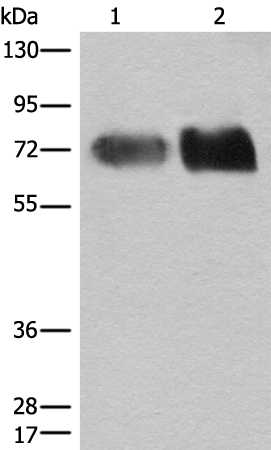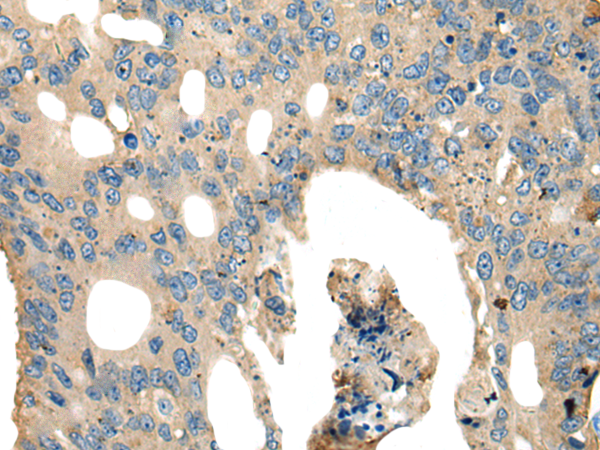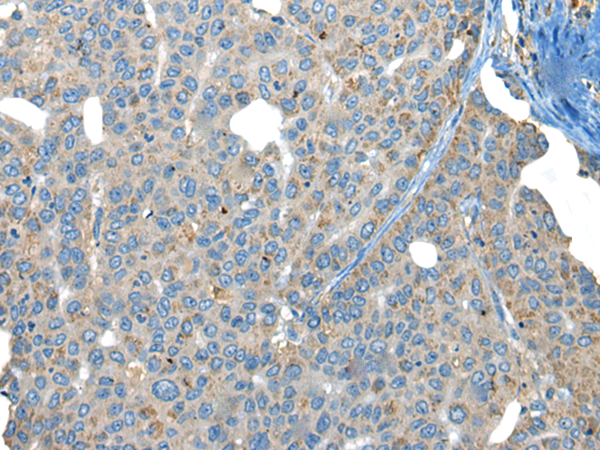


| WB | 咨询技术 | Human,Mouse,Rat |
| IF | 咨询技术 | Human,Mouse,Rat |
| IHC | 1/50-1/200 | Human,Mouse,Rat |
| ICC | 技术咨询 | Human,Mouse,Rat |
| FCM | 咨询技术 | Human,Mouse,Rat |
| Elisa | 1/2000-1/5000 | Human,Mouse,Rat |
| Aliases | 4F2; CD98; MDU1; 4F2HC; 4T2HC; NACAE; CD98HC |
| WB Predicted band size | 68 kDa |
| Host/Isotype | Rabbit IgG |
| Antibody Type | Primary antibody |
| Storage | Store at 4°C short term. Aliquot and store at -20°C long term. Avoid freeze/thaw cycles. |
| Species Reactivity | Human |
| Immunogen | Fusion protein of human SLC3A2 |
| Formulation | Purified antibody in PBS with 0.05% sodium azide and 50% glycerol. |
+ +
以下是关于CYP2E1抗体的3篇参考文献(示例基于经典研究领域,具体作者和标题可能需根据实际文献调整):
---
1. **文献名称**: "Cytochrome P450 2E1 (CYP2E1) antibody characterization in alcoholic liver disease"
**作者**: Lu Y., Cederbaum A.I.
**摘要**: 该研究利用特异性CYP2E1抗体,通过免疫印迹和免疫组化技术,发现酒精性肝病患者肝脏中CYP2E1蛋白表达显著升高,且与氧化应激标志物相关,提示CYP2E1在酒精诱导的肝损伤中起关键作用。
2. **文献名称**: "Role of CYP2E1 in the hepatotoxicity of acetaminophen and the induction of antibody-based detection methods"
**作者**: Guengerich F.P., et al.
**摘要**: 研究通过制备抗CYP2E1多克隆抗体,验证其对乙酰氨基酚代谢产物的特异性识别,证明CYP2E1激活毒性中间体是药物性肝损伤的主因,抗体检测为毒性机制研究提供工具。
3. **文献名称**: "CYP2E1 antibody inhibition attenuates high-fat diet-induced hepatic steatosis and fibrosis"
**作者**: Abdelmegeed M.A., et al.
**摘要**: 使用CYP2E1中和抗体干预高脂饮食小鼠,结果显示肝脏脂质沉积和纤维化程度降低,表明靶向CYP2E1可能是治疗代谢相关脂肪性肝病的潜在策略。
---
**备注**:以上为示例性内容,实际文献需通过PubMed或Google Scholar检索关键词“CYP2E1 antibody”获取。建议参考近5-10年高影响力期刊(如*Hepatology*、*Toxicology*等)以确保证据时效性。
CYP2E1 (Cytochrome P450 2E1) is a member of the cytochrome P450 enzyme superfamily, primarily expressed in the liver and involved in the metabolism of endogenous compounds and xenobiotics. It plays a critical role in oxidizing small hydrophobic molecules, including ethanol, acetaminophen, and industrial solvents, often generating reactive oxygen species (ROS) that contribute to cellular oxidative stress. CYP2E1 is highly inducible by alcohol, obesity, and diabetes, making it a key focus in studying alcohol-induced liver injury, drug toxicity, and metabolic disorders.
Antibodies targeting CYP2E1 are essential tools for detecting its expression and activity in tissues or cell cultures. They are widely used in techniques like Western blotting, immunohistochemistry (IHC), and immunofluorescence to investigate CYP2E1's role in disease mechanisms. For instance, elevated CYP2E1 levels are linked to alcoholic liver disease, non-alcoholic fatty liver disease (NAFLD), and certain cancers. Researchers also employ these antibodies to study interactions between CYP2E1 and other proteins or signaling pathways, as well as its regulation under varying physiological or pathological conditions.
Commercial CYP2E1 antibodies are typically raised against specific epitopes of human or rodent CYP2E1 proteins. However, variability in antibody specificity and cross-reactivity across species requires careful validation. Studies using these antibodies have revealed tissue-specific expression patterns and underscored CYP2E1's dual role as both a detoxifying enzyme and a contributor to oxidative damage, highlighting its therapeutic and diagnostic relevance in metabolic and toxicological research.
×